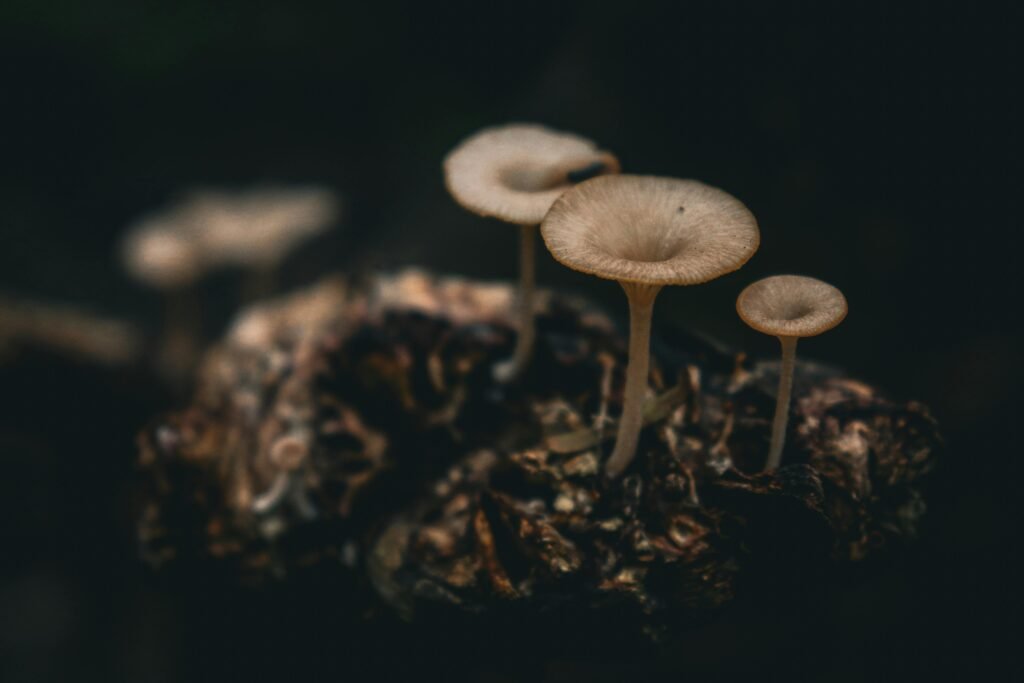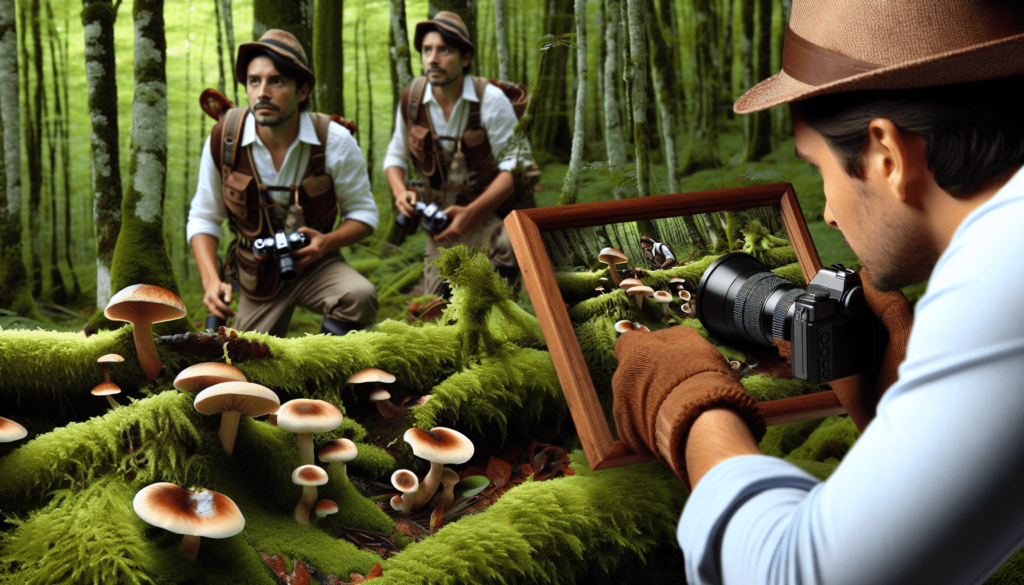Are you curious about the allure of mushroom hunting? Wondering what draws people into the vast, enchanting world of fungi exploration? Embark on a journey with us as we uncover the captivating reasons behind the growing popularity of mushroom hunting. From the thrill of the hunt to the satisfaction of discovering elusive treasures in the wild, this article sheds light on the point of mushroom hunting and why it continues to captivate the hearts of so many nature enthusiasts. So grab your basket and join us in unraveling the mysteries hidden beneath the forest canopy.
Understanding Mushroom Hunting
The Definition of Mushroom Hunting
Mushroom hunting, also known as mushroom foraging, is the activity of gathering various types of mushrooms from their natural habitats. It involves venturing into forests, fields, and other mushroom-rich areas in search of these fascinating fungi.
The History of Mushroom Hunting
Mushroom hunting is as old as human civilization itself. Ancient cultures, such as the Egyptians, Greeks, and Romans, valued mushrooms for their medicinal and culinary properties. Throughout history, mushroom hunting has remained a popular activity, passed down through generations.
The Appeal of Mushroom Hunting
Mushroom hunting provides a unique and rewarding experience for enthusiasts of all ages. It combines the thrill of exploration with the joy of discovering and learning about different mushroom species. The beauty of nature, the sense of adventure, and the potential culinary and medicinal benefits all contribute to the timeless appeal of mushroom hunting.
The Benefits of Mushroom Hunting
Connecting with Nature
Mushroom hunting allows you to immerse yourself in the natural world. It provides an opportunity to escape the fast-paced urban lifestyle and to connect with the peacefulness and tranquility of nature. The solitude experienced while searching for mushrooms can be therapeutic and rejuvenating, as you listen to the sounds of the forest and breathe in the fresh air.
Healthy Physical Activity
Going mushroom hunting involves physical exertion, such as walking, climbing, and bending. It is a form of exercise that engages both the body and the mind. The physical activity helps improve cardiovascular health, strengthens muscles, and promotes overall well-being.
Mental Stimulation and Relaxation
Mushroom hunting is an excellent way to stimulate your mind. It requires observation, critical thinking, and problem-solving skills as you identify various mushroom species and determine their edibility. Additionally, being immersed in nature and engaging in a mindful activity can be deeply relaxing, reducing stress and promoting mental clarity.

Mushroom Hunting as a Hobby
Enjoying the Outdoors
Mushroom hunting provides the perfect excuse to spend time outdoors and explore new environments. Whether you are walking through a serene forest, hiking up a mountain, or strolling in a meadow, the natural beauty surrounding you is awe-inspiring. Each outing brings new opportunities to appreciate the wonders of the great outdoors.
Learning About Fungi
For those fascinated by the natural world, mushroom hunting offers an opportunity to deepen your understanding of fungi. You will encounter an array of mushroom species, each with its unique characteristics and habitat preferences. Through observation and research, you can expand your knowledge of mycology and contribute to citizen science initiatives.
Thrill of the Hunt
One of the most exciting aspects of mushroom hunting is the thrill of the hunt itself. As you search for hidden treasures in the forest, there is a sense of anticipation and curiosity, never knowing what you might stumble upon. The satisfaction of finding a coveted edible or rare mushroom is indescribable, and it fuels the passion for this hobby.
Foraging for Culinary Delights
Exploring Different Flavors
Mushroom hunting opens up a whole new world of flavors for culinary enthusiasts. There is a wide variety of edible mushrooms available, each with its distinct taste profile. From the earthy notes of the porcini mushroom to the delicate, nutty flavor of the chanterelle, mushroom hunters have the opportunity to explore and experiment with unique flavors in their cooking.
Sustainable and Organic Food
Foraging for mushrooms is an environmentally friendly way to source food. By harvesting mushrooms from their natural habitats, you reduce your reliance on mass-produced and heavily processed food. Additionally, wild mushrooms are free from chemicals and pesticides, offering a healthier and more organic option for your meals.
Creating Unique Dishes
Mushrooms are incredibly versatile in the kitchen, allowing for the creation of unique and delicious dishes. Adding freshly foraged mushrooms to your recipes can elevate the flavor and texture of your meals. From sautéing them as a side dish to incorporating them into soups, stews, omelets, and pasta dishes, the possibilities are endless.

Medicinal and Healing Properties
Traditional Medicinal Uses
Throughout history, mushrooms have played a vital role in traditional medicine practices worldwide. Certain mushroom species, such as the reishi, shiitake, and lion’s mane, have been used for their potential health benefits, including boosting the immune system, reducing inflammation, improving cognitive function, and promoting overall well-being.
Potential Health Benefits
Modern scientific research is increasingly uncovering the potential health benefits of mushrooms. Many species contain bioactive compounds, including antioxidants, vitamins, and minerals, that have been linked to various health advantages. Incorporating mushrooms into your diet can support immune function, improve digestion, and contribute to a balanced and nutritious lifestyle.
Finding Natural Remedies
For those interested in natural healing methods, mushroom hunting offers the chance to discover and learn about traditional remedies. Indigenous cultures have long used mushrooms for their medicinal properties. Exploring the potential healing properties of mushrooms can empower individuals to take charge of their health and explore alternative options.
The Art of Mushroom Photography
Capturing Nature’s Beauty
Mushrooms showcase exquisite natural beauty that is often overlooked. With their vibrant colors, intricate shapes, and delicate textures, they make captivating subjects for photography. Mushroom hunting provides the opportunity to capture stunning images that showcase the unique and often fleeting beauty of these fungi.
Sharing with Others
Photography allows mushroom hunters to share their discoveries with others. Sharing images of unique and rare mushroom species can pique interest, spark curiosity, and inspire a deeper appreciation for the natural world. It provides a means to educate and raise awareness about the diverse fungi found in our ecosystems.
Documenting Species
Mushroom photography serves as a valuable tool for documenting and studying different mushroom species. By photographically documenting the various characteristics of mushrooms, such as size, color, and habitat, enthusiasts can contribute to scientific research and assist in the identification and classification of fungi.

Environmental Conservation
Promoting Conservation Efforts
Mushroom hunting goes hand in hand with environmental conservation. Responsible mushroom foraging involves practicing sustainable harvesting techniques, leaving behind mature mushrooms to disperse spores and contribute to the natural ecosystem. By promoting ethical and responsible mushroom hunting practices, enthusiasts play a role in preserving and protecting natural habitats.
Monitoring Ecosystems
Mushroom hunting also provides an opportunity to monitor and assess the health of ecosystems. Certain mushroom species are sensitive to changes in environmental conditions, making them useful indicators of overall ecosystem health. By observing and documenting the presence and abundance of different mushroom species, hunters can contribute valuable data to scientific studies.
Understanding Biodiversity
Mushroom hunting encourages a deeper understanding of biodiversity and the interconnectedness of species within ecosystems. As hunters encounter different mushrooms and learn about their roles in nature, they gain a greater appreciation for the intricate web of life. This knowledge can inspire a sense of responsibility and a desire to protect and preserve biodiversity.
Social and Community Engagement
Building Relationships
Mushroom hunting can be a social activity, creating opportunities to build relationships and strengthen connections with like-minded individuals. Joining local mushroom hunting groups, attending workshops, and participating in forays or organized events allow enthusiasts to meet fellow mushroom lovers, exchange knowledge, and create lasting friendships.
Participating in Events
Mushroom hunting often involves participating in organized events and festivals dedicated to fungi. These events provide a platform to learn from experts, attend educational talks, engage in mushroom identification sessions, and sample unique culinary creations. Participating in such events adds another layer of enjoyment and community engagement to the hobby.
Joining Mushroom Hunting Clubs
Mushroom hunting clubs offer a supportive and inclusive community for enthusiasts of all levels. Joining a club provides access to educational resources, expert guidance, and organized outings. It offers a space to share experiences, exchange tips and advice, and further deepen your passion for mushroom hunting through the camaraderie of fellow club members.

Safe and Responsible Mushroom Hunting
Identifying and Avoiding Poisonous Mushrooms
Safety is of utmost importance in mushroom hunting. It is crucial to learn how to identify poisonous mushrooms and avoid consuming them. Proper education and training are essential to differentiate between edible and toxic species. Relying on reputable field guides, attending workshops, and seeking guidance from experienced foragers can help ensure safe and enjoyable mushroom hunts.
Respecting Nature and Wildlife
Responsible mushroom hunting includes showing respect for the natural environment and the wildlife that inhabit it. Staying on designated trails, leaving no trace, and avoiding damage to habitats are vital practices. By minimizing our impact and leaving the environment undisturbed, we can preserve fragile ecosystems and ensure the sustainability of mushroom populations for future generations.
Obtaining Proper Permissions
When venturing onto private or protected lands, it is essential to obtain proper permissions from landowners or responsible authorities. Respect their rights, restrictions, and guidelines, and always follow local regulations regarding mushroom hunting. Obtaining permission not only ensures a legal and ethical approach but also fosters positive relationships and maintains access to mushroom-rich areas.
Conclusion
Discovering the Joys of Mushroom Hunting
Mushroom hunting offers an immersive and fulfilling experience for nature enthusiasts, culinary explorers, health-conscious individuals, photographers, and conservationists alike. In addition to the physical, mental, and social benefits, mushroom hunting allows us to embrace the wonders of the natural world and forge a deeper connection with the environment.
Embracing Nature’s Wonders
Through each mushroom-hunting adventure, you have the opportunity to discover the hidden treasures of the forest floor, expand your knowledge of fungi, appreciate the beauty of nature, and contribute to environmental conservation. So, why not embark on a journey of exploration and embrace the wonders of mushroom hunting? Step into the forest and let nature reveal its secrets to you.

